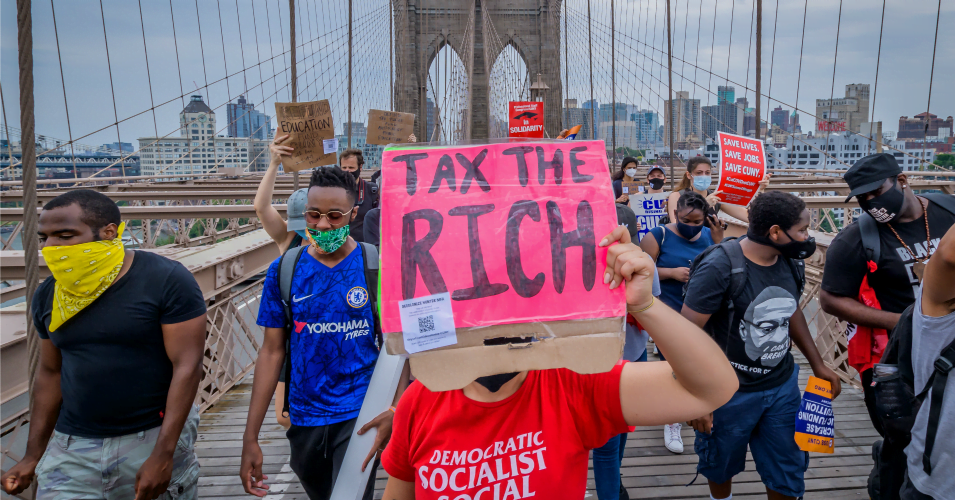From CommonDreams
Out of the UK, a Bold Pay Prescription for a Post-Trump America
Two British think tanks are calling for a cap on the compensation that goes to corporate chiefs.

A demonstrator holds a “Tax the Rich” sign during a protest in New York on June 27, 2020. (Photo: Erik McGregor/LightRocket via Getty Images)
On November 9, 1932, the day after Election Day, progressively minded Americans woke up feeling a sense of relief — and a sense they might finally have an opportunity to forge real social change. At that moment, in the depth of the Great Depression, progressives could sense a new beginning.
Franklin D. Roosevelt, the new president that election would send to the White House, would soon bring some immediate relief from the callous approach to massive deprivation that the previous Hoover administration had so often displayed. FDR’s “First 100 Days” in 1933 would see a torrent of moves to arrest the economy’s frighteningly downward spiral.
But what we know today as the “New Deal” — Social Security, labor rights, and so much more — would only start taking shape two years later, after massive mobilizations of workers, seniors, and the unemployed recast the popular sense of what government could and should do.
“Top UK corporate execs currently average 126 times the pay of average British workers, a gap substantially wider than the corporate pay divide in the rest of Europe but far lower than Corporate America’s astounding gap.”
If Joe Biden emerges as the winner on our upcoming Election Day, his new administration — like FDR’s — will need to quickly focus on providing some badly needed immediate relief, from pandemic this time and not just economic collapse. But then what? How can we take advantage of the opportunity for real social change that a Biden victory would put on the table? What sort of fundamental change should Americans be mobilizing to achieve?
We now have one bold and daring new suggestion from our British cousins.
Earlier this month, two leading UK research groups — Autonomy, a think tank that focuses on the future of work and economic planning and the High Pay Centre, a nonprofit that highlights excessive British corporate executive pay — jointly called for a “maximum wage” throughout the British economy.
Corporate executive salaries, the two progressive centers advise in a new joint report, “should be capped to raise wages for lower-paid workers and to help save jobs.”
“With the UK economy likely to be much smaller than previously envisaged for the foreseeable future,” explains the High Pay Centre’s Luke Hildyard, “we urgently need to think about sharing the wealth we do have more evenly.”
This is the world we live in. This is the world we cover.
Because of people like you, another world is possible. There are many battles to be won, but we will battle them together—all of us. Common Dreams is not your normal news site. We don’t survive on clicks. We don’t want advertising dollars. We want the world to be a better place. But we can’t do it alone. It doesn’t work that way. We need you. If you can help today—because every gift of every size matters—please do. Without Your Support We Simply Don’t Exist.
Please select a donation method:




